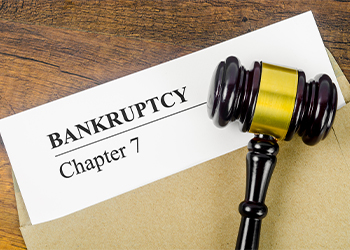What Disqualifies Assets from Chapter 7 Exemptions?
June 30, 2025
 If you're considering Chapter 7 bankruptcy to resolve your financial challenges, it's essential to understand which assets are protected (or exempt) under Virginia law.
If you're considering Chapter 7 bankruptcy to resolve your financial challenges, it's essential to understand which assets are protected (or exempt) under Virginia law.
While Chapter 7 bankruptcy can eliminate many debts, not all assets qualify for exemption. Knowing what disqualifies certain assets from Chapter 7 exemptions can help you avoid surprises.
At Vivona Pandurangi, PLC, our experienced attorneys assist individuals and businesses across Virginia, including Falls Church, Alexandria, Arlington, Fairfax, Manassas, Prince William, and Loudoun, in achieving debt relief through bankruptcy filings. In this blog, we provide an overview of the different types of bankruptcy filings and how they can help you get back on track financially.
What Are Chapter 7 Bankruptcy Exemptions?
Under Chapter 7 bankruptcy, some of your assets are classified as exempt. This means they are shielded from liquidation by the bankruptcy trustee. Exempt assets often include items deemed essential for maintaining basic living standards, such as your home, car, and personal necessities. Non-exempt assets, however, are subject to liquidation to repay creditors.
What Disqualifies Assets from Chapter 7 Exemptions?
Unfortunately, not all assets qualify for exemption under Chapter 7 bankruptcy. The eligibility of an asset depends on several factors, including its type, value, and utilization. Below are the key elements that could disqualify assets from protection under Chapter 7 exemptions.
Exceeding Value Limits
Many exemptions in Virginia come with value limits, which cap the dollar amount of protection for specific assets. For example:
Homestead exemption: Virginia allows a homestead exemption of up to $25,000 if you're over 65 or claim dependents. For others, the exemption generally caps at $5,000.
Vehicle exemption: You can protect up to $6,000 in the value of a single motor vehicle.
If your asset exceeds these limits, the remainder may be subject to liquidation. If your car’s fair market value is $8,000 and the loan is fully paid off, Virginia law exempts only $6,000. This leaves $2,000 potentially subject to liquidation.
Luxury Items
Luxury items are not considered necessary for daily living and, therefore, may not qualify for exemption. Some common examples of luxury items include the following.
Jewelry exceeding the exemption limit of $5,000
Collectibles such as rare art or stamps
Expensive electronics that go beyond what is reasonable for daily use
The bankruptcy trustee will likely liquidate any luxury items that could be considered extravagant or unrelated to your essential living needs.
Assets with Improper Transfers
If you transferred an asset to someone else (e.g., a family member or friend) shortly before filing for bankruptcy, the bankruptcy trustee might categorize this as a fraudulent transfer. Under Virginia law, trustees can reclaim assets that were unlawfully transferred within four years before filing, provided the transfer was intended to conceal property from creditors.
Even if the transfer was not malicious, unintentional errors in how assets are managed or disclosed can lead to their inclusion in non-exempt assets.
Fully Paid-Off Investment Properties
While primary residences are often protected under the homestead exemption, secondary or investment properties are typically not exempt unless they fall under specific exceptions. For example, a rental property, secondary residence, or vacation home is likely fair game for liquidation under Chapter 7 bankruptcy.
If these properties are entirely paid off, they hold higher liquidation value and are rarely protected under Virginia exemption laws.
Non-Exempt Financial Assets
Certain financial assets are rarely exempt under Chapter 7 bankruptcy. Some common examples of non-exempt financial assets include the following.
Savings or checking account balances
Stocks and other investments
Tax refunds (with exceptions for earned income tax credits)
Business cash reserves or financial holdings
The bankruptcy trustee will review your assets to determine if they qualify for exemption. In Virginia, transferring significant account balances into exempt categories, such as annuities, shortly before filing for bankruptcy is often subject to close scrutiny.
Virginia Laws and Chapter 7 Exemptions
If you're filing Chapter 7 bankruptcy in Virginia, understanding state exemption laws can help you protect your assets. Virginia does not allow debtors to use federal exemption guidelines; instead, you must follow the state's own exemption list. The primary exemptions in Virginia include:
Homestead exemption: $50,000, with an additional $500 for each dependent. Seniors over 65 or individuals with dependents may be exempt up to $25,000.
Personal property: Personal property, selected by the householder, including money and debts not exceeding $5,000 in value. If the householder is 65 years of age or older, this limit is increased to $10,000.
Wildcard exemption: Virginia offers a wildcard exemption of $5,000, which can be applied to any personal property not otherwise exempt.
Vehicle exemption: Equity of up to $10,000 in your primary vehicle is fully protected.
Professional tools exemption: Tools of the trade, including work-related implements, are exempt up to $10,000.
Social Security and retirement funds: Social Security benefits and tax-exempt retirement accounts (like IRAs or 401(k)s) are generally protected.
Virginia’s bankruptcy code is notably stricter than those of many other states. Any errors or omissions in filing or the misapplication of the law can result in the loss of eligible exemptions.
Bankruptcy Attorneys Serving Falls Church and Alexandria, Virginia
At Vivona Pandurangi, PLC, we strive to simplify the bankruptcy process and minimize any resulting complications and costs. If you or someone you know is struggling with overwhelming debt, consider reaching out to an attorney who can help you understand your options.
With offices in Falls Church and Alexandria, Virginia, we serve clients throughout Arlington, Fairfax, Manassas, Prince William, and Loudoun. Contact us today to schedule a consultation and learn how to protect your assets through Chapter 7 bankruptcy.
